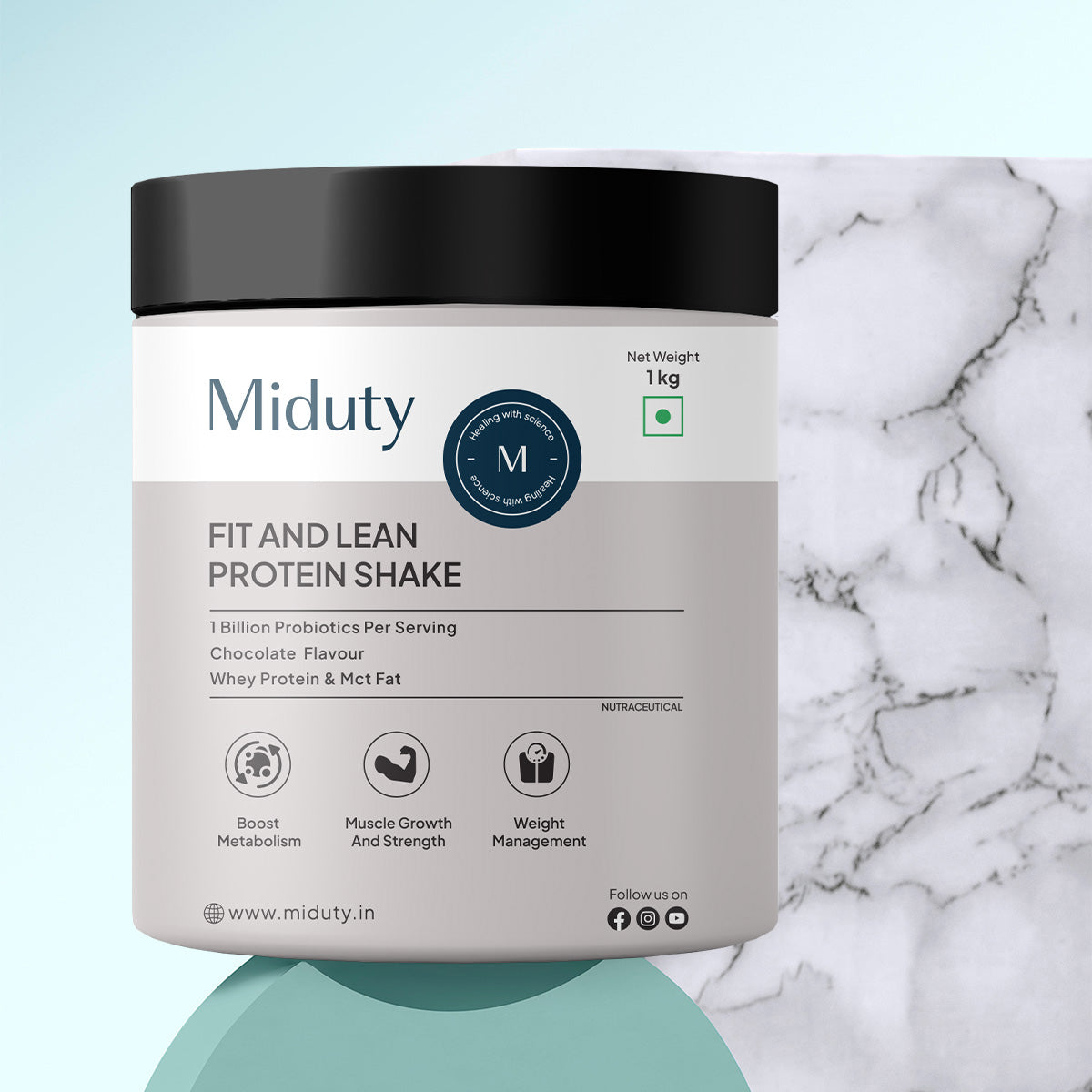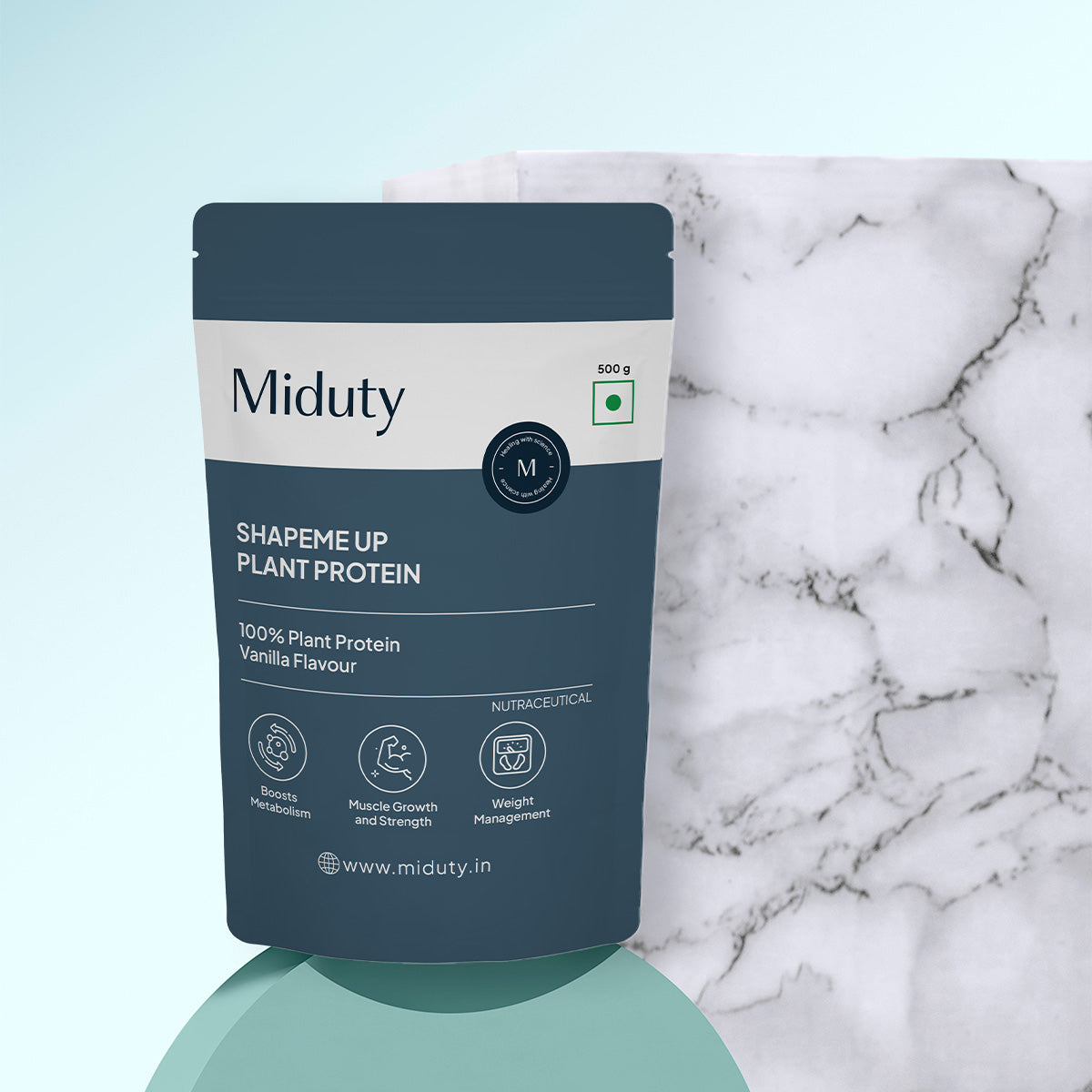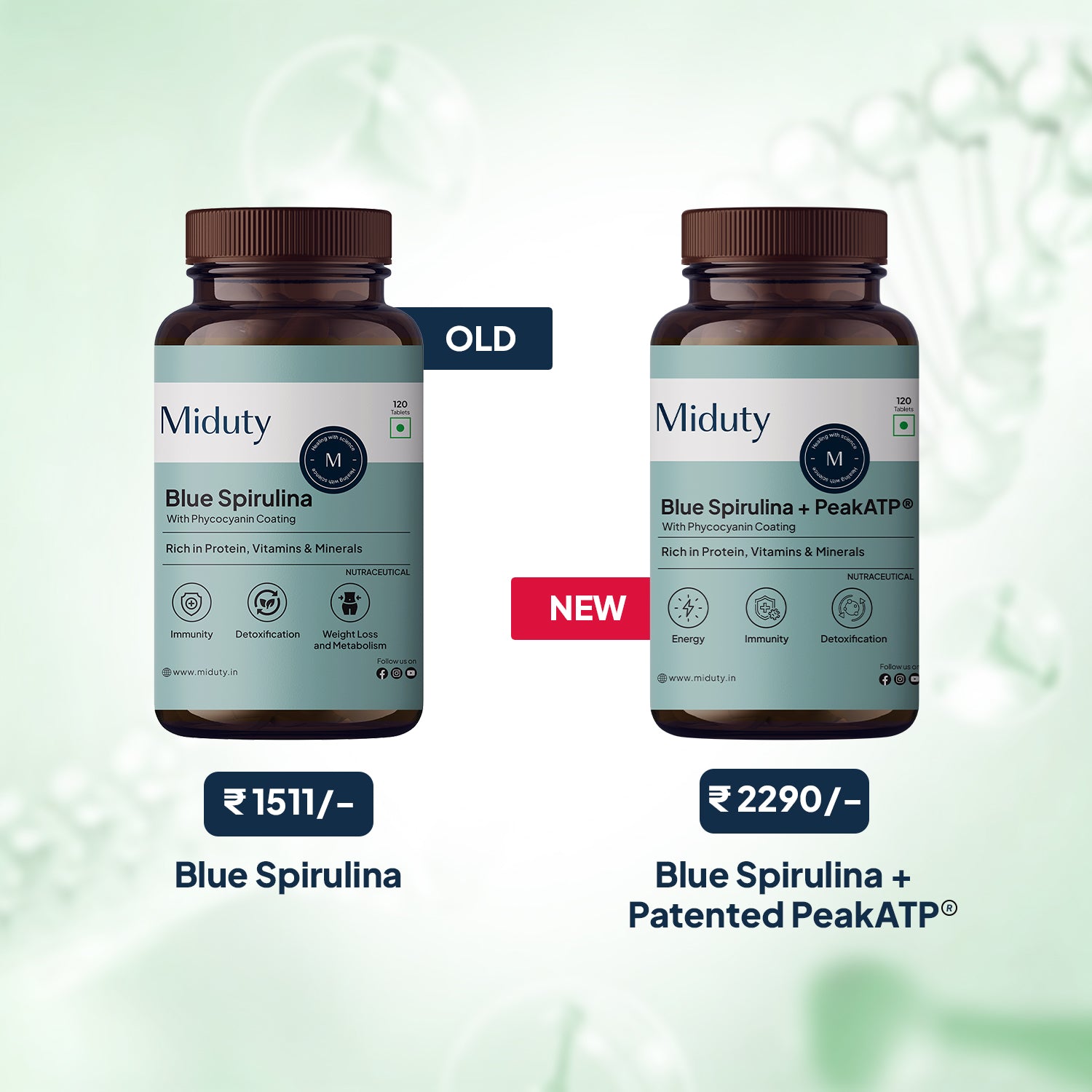
How to Choose the Right Protein Powder for Your Body
Walk into any gym, scroll through fitness pages, or chat with someone who recently started working out, and one thing always comes up: protein. Everyone seems to have a favorite protein powder, shake routine, or supplement recommendation. But with so many types on the market, the real struggle is figuring out which protein is actually right for your body.
You may have tried a protein that made you feel bloated, one that didn't mix well, or one that tasted so bad you abandoned it after two scoops. Or maybe you bought a popular protein thinking it would transform your results, only to see no real difference.
Here's the truth: choosing the wrong protein is like wearing the wrong size of shoes. They might look good, but they won't help you perform, and eventually, they become uncomfortable. The right protein, however, can level up your workouts, speed up recovery, improve metabolism, and boost overall health effortlessly.
This guide breaks down how to choose the protein that matches your goals, digestion, lifestyle, and fitness routine so you get the best results possible.
Key Takeaways
1. The right protein depends on your goals. Whether you want muscle gain, fat loss, better recovery, or general wellness, different protein types support different outcomes.
2. Your body and diet matter just as much as your fitness goals. Factors like lactose sensitivity, digestive issues, vegan preferences, or low-carb diets play a major role in determining the best protein for you.
3. Not all protein powders are created equal. Understanding the differences between whey, casein, plant proteins, collagen, egg protein, and hydrolysates helps you choose the one that fits your needs best.
4. Ingredient quality impacts results and digestion. Clean formulas with minimal ingredients, natural sweeteners, and third-party testing are crucial for better absorption and fewer side effects.
5. Lifestyle and personal preference make a big difference. How active you are, how often you travel, your age, and even taste and mixability all influence which protein you'll consistently use and benefit from most.
Why Protein Matters?
Protein is more than just a muscle-building nutrient. It is a key component in nearly every process your body performs daily. Whether you are lifting weights, trying to lose fat, improving your diet, or simply staying active, protein plays a critical role behind the scenes.
Your muscles, hormones, immune system, skin, hair, nails, and even enzymes depend on protein to function properly. When your diet lacks adequate protein, your body starts breaking down muscle tissue to compensate, which leads to weakness, slower recovery, reduced metabolism, and increased cravings.
Adequate protein intake also helps keep you fuller longer, supports stable blood sugar levels, and prevents overeating. For people who exercise or live busy lifestyles, protein supplementation becomes even more helpful because whole foods are not always enough to meet daily requirements.
Simply put, protein is foundational for strength, energy, metabolism, recovery, and long-term health. Choosing the right supplement makes it easier to meet your needs consistently and unlock your full physical potential.
Why Choosing the Right Protein Powder Is Important?
Protein is essential for building muscle, supporting recovery, and fueling your body—but not all protein powders are the same. Picking the wrong one can lead to digestive issues, poor results, or wasted money.
The right protein powder should align with your goals (like weight loss or muscle gain) and dietary needs (vegan, lactose-free, allergen-friendly). While whey isolate works great for fast recovery, casein is better for slow-release support. Plant-based proteins offer clean alternatives but may need blending for a complete amino acid profile.
Low-quality powders often contain fillers, artificial sweeteners, and poor digestibility, which can cause bloating or skin breakouts. Choosing a high-quality, goal-specific powder helps you:
- Boost results and recovery
- Improve nutrition
- Avoid side effects
- Stay consistent with your routine
In short, the right protein powder supports your journey—while the wrong one can slow it down.
Understanding Body Types
When it comes to fitness and nutrition, understanding your body type is key to choosing the right protein powder and reaching your goals faster. The three main body types:ectomorph, mesomorph, and endomorph, respond differently to food, exercise, and supplements.
1. Ectomorph (Naturally Thin)
- Traits: Fast metabolism, lean build, struggles to gain weight/muscle
- Needs: Higher calorie and protein intake
- Best Protein: Mass gainers, whey concentrate, or protein blends with carbs
2. Mesomorph (Naturally Athletic)
- Traits: Muscular, balanced metabolism, gains muscle easily
- Needs: Moderate to high protein intake
- Best Protein: Whey isolate or casein, based on training goals
3. Endomorph (Naturally Stocky)
- Traits: Stores fat easily, slower metabolism
- Needs: High-protein, low-carb supplements
- Best Protein: Whey isolate, pea protein, or clean plant-based blends
Knowing your body type helps you choose the right macronutrient balance, protein source, and supplement strategy. Tailoring your protein intake this way ensures you're working with your body, not against it.
How to Choose the Right Protein for Your Body?
Step 1: Identify Your Health and Fitness Goals
Before choosing a protein, it is important to understand what you want to achieve. Your goals will influence the protein type, how fast it should digest, and the formula that best supports your routine.
If your goal is muscle gain, proteins like whey concentrate, whey isolate, and whey hydrolysate are excellent choices. These forms digest quickly, provide a full amino acid profile, and help stimulate muscle protein synthesis. They are especially useful for men and women who engage in heavy strength training. [1]
If your goal is fat loss, whey isolate, casein protein, or plant protein blends such as pea and rice are more suitable. These options are typically lower in calories, higher in satiety, and better for maintaining lean mass while cutting fat. Casein, in particular, helps control appetite because of its slow digestion rate. [2]
If your goal is overall wellness, plant proteins, collagen, and whey concentrate are great everyday choices. They support balanced nutrition without being overly targeted toward muscle building. These proteins also tend to be gentle on the digestive system, making them ideal for long-term use.
If your goal is faster recovery, whey hydrolysate, whey isolate, and plant proteins with added BCAAs can significantly accelerate muscle repair. These proteins absorb quickly and help reduce soreness after intense workouts. They are ideal for athletes or anyone training multiple times per week.
Step 2: Consider Your Dietary Needs
Your dietary preferences, allergies, or sensitivities determine which protein your body will tolerate best. Choosing accordingly helps prevent bloating, discomfort, or digestive issues.
If you have lactose sensitivity, whey isolate, plant proteins, or collagen are better options. Whey isolate contains very little lactose and is usually well-tolerated, while plant and collagen proteins are naturally lactose-free. These choices help you meet protein goals without digestive discomfort.
If you follow a vegan or vegetarian diet, pea protein, rice protein, hemp protein, and multi-source plant blends work best. Plant blends provide a complete amino acid profile that closely mimics animal-based proteins. They are also high in antioxidants and minerals, supporting overall health.
If you have digestive issues, collagen, rice protein, and whey isolate are gentle and easy to digest. Collagen supports gut lining health, rice protein is hypoallergenic, and whey isolate has minimal additives. These options help increase protein intake without causing bloating or indigestion.
If you follow a low-carb or keto lifestyle, whey isolate, egg white protein, and collagen fit perfectly. These proteins contain minimal carbohydrates and support stable energy levels throughout the day. They also help preserve muscle mass during low-carb dieting.
Step 3: Understand the Different Types of Protein
Protein powders vary widely in quality, absorption speed, and nutritional benefits. Understanding these differences helps you choose one that truly aligns with your health goals.
Whey concentrate is affordable, great for beginners, and contains beneficial nutrients, though it also contains some lactose. It provides a balanced digestion rate and is ideal for those who want a cost-effective protein option.
Whey isolate offers a cleaner, faster-digesting form of protein with very low lactose. It supports lean muscle growth and is perfect for people focusing on fat loss or needing quick post-workout absorption.
Whey hydrolysate is pre-digested, allowing for ultra-fast absorption and reduced digestive strain. It is especially beneficial for athletes or individuals with heavy training schedules who need rapid recovery.
Casein protein digests slowly, making it ideal for nighttime use. Its prolonged release of amino acids keeps your muscles nourished while you sleep and helps control appetite throughout the day.
Plant proteins offer various benefits depending on the source. Pea protein is rich in essential amino acids, rice protein is hypoallergenic, and hemp contains fiber and omega fats. Plant protein blends are typically the best option because they provide a complete amino acid profile.
Collagen protein supports skin, joints, hair, and gut health. Although not a complete protein, it is an excellent complement to your diet for improving recovery and overall vitality.
Egg white protein is dairy-free and naturally rich in leucine, which supports muscle synthesis. It is an excellent alternative for people who cannot consume dairy but still want a high-quality protein option.
Step 4: Check Ingredients and Quality
The ingredients and purity of a protein powder can make a significant difference in digestion, results, and long-term health. Clean formulas always deliver a better experience.
Look for proteins that use non-GMO ingredients, transparent labeling, and natural sweeteners like stevia or monk fruit. These options ensure that you are consuming a clean product without unnecessary additives. Third-party tested supplements guarantee safety and accurate ingredient claims.
Avoid proteins that contain artificial sweeteners, added sugars, vegetable oils, artificial colors, or excess fillers. These ingredients can cause digestive discomfort and reduce the nutritional value of the protein. A clean label often reflects a higher-quality product.
Step 5: Match the Protein to Your Lifestyle
Your daily routine plays a major role in choosing a protein that fits seamlessly into your habits. Selecting the right format helps you stay consistent long-term.
If you have a busy lifestyle, whey isolate, plant blends, or ready-to-mix formulas are ideal. They blend quickly and provide instant nourishment without requiring meal prep. This makes them perfect for people with hectic schedules.
If you train heavily, whey hydrolysate, whey isolate, or plant proteins with added amino acids offer the best support. These proteins help repair muscles faster and enhance strength and endurance. They are well-suited for athletes or those following intense training programs.
If you travel often, single-serve packets, protein bars, and whey isolate or concentrate are convenient options. They are portable, easy to mix, and help you maintain your protein intake even on busy travel days.
If you are over 40, whey isolate, collagen, and plant proteins support maintaining muscle mass, improving recovery, and promoting joint health. These proteins help counteract natural age-related muscle loss.
Step 6: Taste, Mixability, and Personal Preference
Even the highest-quality protein will not help if you cannot tolerate the taste or texture. Choosing a protein you enjoy makes sticking to your routine much easier.
Consider how well the protein blends in water or milk, how smooth the texture is, and whether the flavor suits your preferences. Many brands offer sample packs, which are a great way to test different options before committing to a full-size tub. Reading reviews can also give you a realistic idea of taste and mixability.
Avoid proteins that are chalky, overly sweet, or difficult to mix. Flavors that do not pair well with common beverages or recipes may also limit your ability to use the protein regularly.
What to Avoid in Protein Powders?
Not all protein powders are created with your health in mind. Some are packed with harmful ingredients that can lead to bloating, sugar crashes, or even long-term health issues. Here's what to steer clear of:
1. Artificial Sweeteners & Flavors
Avoid aspartame, sucralose, and acesulfame potassium. These may disrupt gut health and cause headaches or bloating. Choose natural options like stevia or monk fruit.
2. Fillers & Gums
Ingredients like maltodextrin, soy lecithin, or xanthan gum add bulk but no nutrition—and can irritate your gut. Look for clean, minimal ingredients.
3. High Sugar Content
Some powders have more sugar than protein. Skip anything with over 5g of sugar per serving or hidden sugars like fructose and dextrose.
4. Low-Quality Protein Blends
Watch out for vague "protein blends" with undisclosed sources. Choose clearly labeled options like whey isolate, pea, or organic rice protein.
5. Artificial Colors & Preservatives
Bright-colored powders often contain synthetic dyes and chemicals. These offer no benefit and may disrupt hormones or trigger allergies.
6. Contaminants & Heavy Metals
Low-quality powders may contain lead, arsenic, or other toxins. Always choose third-party tested brands with certifications like NSF or Informed Choice.
How Much Protein Do You Need?
Your protein needs vary based on activity level, age, and goals.
General guidelines
- Sedentary adults: 0.8 g per kg
- Active individuals: 1.2–1.6 g per kg
- Muscle building: 1.6–2.2 g per kg
- Fat loss with muscle retention: 1.6–2.0 g per kg
Supplements should support whole foods, not replace them entirely.
Conclusion
The best protein for you is one that works with your goals, digestion, and lifestyle. Whey isolates and hydrolysates are excellent for muscle and recovery. Plant proteins are ideal for overall wellness and digestion. Collagen supports skin, joint, and gut health. And egg protein works well for those who avoid dairy.
Choosing a high-quality, clean formula ensures you get maximum benefits. Take your time, check labels, listen to your body, and choose a protein that helps you feel stronger, healthier, and more energized every day.
FAQ's on Right Protein for Body -
Q1 - How do I know which protein is best for me?
The best type of protein for you depends on your goals and dietary needs. A balanced diet usually includes lean meats, poultry, fish, eggs, dairy, and plant-based sources like beans, lentils, nuts, and tofu. If you're looking for supplements, whey protein is excellent for muscle building, while plant-based options such as pea or brown rice protein are great choices for vegetarians or those with dairy sensitivities.
Q2 - How to choose the right protein?
The best protein source varies based on your personal goals and dietary preferences. For those who consume animal products, lean meats, poultry, fish, eggs, and dairy are excellent options. Plant-based eaters can rely on beans, lentils, nuts, seeds, and tofu for high-quality protein. Whey protein works especially well for muscle growth, while plant-based protein powders serve as great alternatives for vegetarians or anyone with dairy allergies.
Q3 - What to avoid in protein powders?
You should avoid protein powders that contain added sugars, artificial sweeteners like sucralose, and thickening agents or gums that may cause digestive discomfort. It's also important to stay away from products with unnecessary fillers, excessive artificial ingredients, or potential heavy metal contaminants such as lead, arsenic, cadmium, and mercury. Choosing a protein powder with a simple, minimal ingredient list is always the safest and smartest option.
Q4 - What is the unhealthiest protein?
The unhealthiest protein options are typically processed meats such as hot dogs, bacon, and salami, which are high in sodium, saturated fat, and preservatives linked to increased health risks. Other poor choices include fatty red meats, deep-fried meats, and certain store-bought protein bars and powders that contain excessive sugar, additives, or unhealthy fats.
Q5 - What's the safest protein?
The safest protein sources are whole foods such as lean meats like chicken and fish, eggs, and legumes, which provide complete and nutrient-rich protein. Among protein powders, whey protein isolate is often considered a safe choice because of its purity and easy digestibility, especially when sourced from grass-fed, hormone-free producers. Many high-quality supplements also undergo third-party testing to ensure safety, purity, and the absence of banned substances.
Q6 - How do I know if a protein powder is good quality?
To determine if a protein powder is high quality, look for at least 20 grams of protein per serving, a complete amino acid profile, and a clean ingredient list with minimal fillers or additives. Third-party certifications such as NSF or Informed-Sport can confirm the product's purity and potency. It's also best to choose reputable brands that are transparent about their sourcing and manufacturing practices.
Q7 - What protein powder is best for sensitive stomachs?
For sensitive stomachs, the best protein powders are usually whey isolate, collagen, or gentle plant-based options like rice or pea protein, as they are easier to digest and low in common irritants. Choosing products without artificial sweeteners, gums, or fillers can further reduce digestive discomfort.
References











